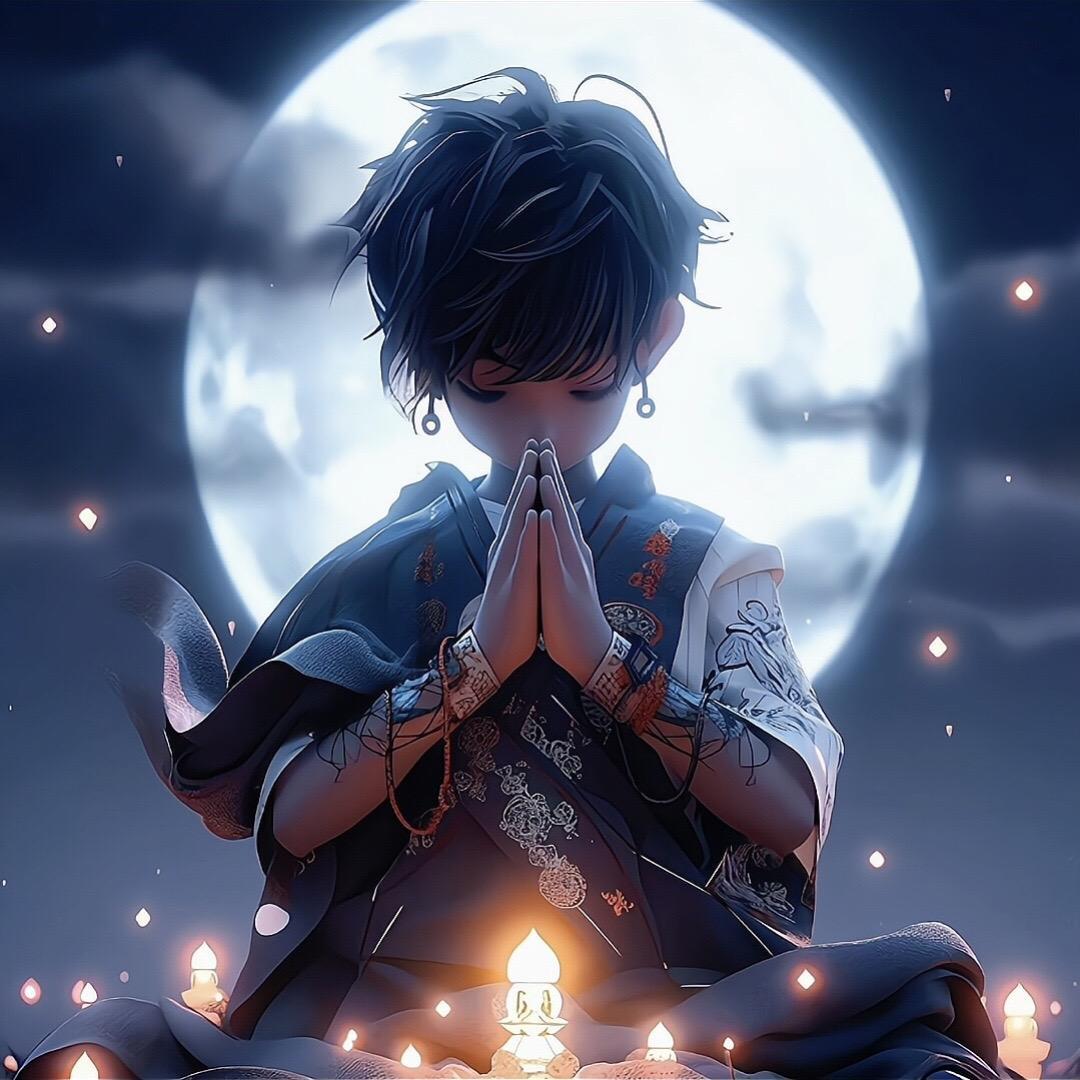In the long ancient times, behind the hustle and bustle of the mortal world, countless people harbored desires and pursuits for wealth. There was a merchant who, in the midst of the materialistic business world, was like a lonely boat tossing about in fierce winds and huge waves. He often encountered numerous setbacks in the business field, and financial difficulties haunted him like an inescapable shadow, constantly shrouding his life.
One day, weighed down by exhaustion and melancholy, the merchant stepped into that serene and mysterious mountain forest. In the forest, ancient trees towered into the sky, their branches intertwined. Sunlight filtered through the gaps, creating patches of mottled light and shadow. It was in this picturesque yet somewhat secluded mountain forest that he happened to meet an old man by chance. The old man had white hair but a youthful complexion, with deep and wise eyes. He wore a simple Taoist robe that fluttered gently in the wind, seeming to blend in with the forest, and exuded an otherworldly aura all around him.
Seeing the merchant's face full of sorrow, the old man let out a soft sigh and slowly said, "If you want to have prosperous business and good fortune, you must have a sincere heart and respect heaven and love people. Wealth in this world is not something without a foundation or a source. It is closely linked to virtue and cannot be separated. Only by having a heart full of reverence, treating others sincerely, and acting with love and doing good deeds can you attract wealth and make it gather around you." Hearing the old man's words, the merchant was like a person who had been groping in the dark for a long time and suddenly saw a glimmer of hope. Although he couldn't fully understand the profound meaning of these words in his heart at that time, that glimmer of hope had quietly taken root in his heart.
After returning home, the merchant began to calm down and reexamine his past behaviors. He realized that in his past business dealings, in order to pursue profits, he sometimes played petty tricks, wasn't honest enough with his business partners, and lacked care for his subordinates and workers. Now, he was determined to change. When negotiating business with clients, he no longer concealed any flaws in the products and told them the truth, exchanging sincerity for trust. When dealing with business partners, he no longer haggled over trifling profits but focused on long-term win-win cooperation. Facing those subordinates and workers who worked hard for him, he increased their salaries, improved their working conditions, and often cared about their hardships in life, offering generous help when they encountered difficulties.
Time flew by like a white horse galloping past a crack. Several years passed in the merchant's perseverance and efforts. During this period, he always adhered to the principle of "sincerity, respecting heaven and loving people" taught by the old man without any slackening. Gradually, wonderful changes began to appear in his business. Those clients who used to avoid him now came to him one after another, signing one big order after another with him. His business partners praised him highly. Not only did they continue to maintain close cooperation with him, but they also introduced many new business opportunities to him. And his subordinates and workers, because of his kind treatment, worked even harder, which greatly improved the production efficiency of his business and refined the product quality. As a result, his business was like a growing tree, flourishing with luxuriant branches and leaves, and wealth flowed into his home like a clear spring in the mountains.
As the merchant's wealth grew day by day, his story gradually spread among the people. People began to spread rumors that the old man he met in the mountain back then was no ordinary person but the God of Wealth in Taoism. The God of Wealth traveled around the world, specifically looking for those virtuous people and bestowing them with good fortune and blessings as a reward for their kind thoughts and good deeds. These rumors spread like wildfire, getting farther and farther and becoming more and more miraculous.
The merchant himself also knew deeply that his current prosperity in business was by no means accidental. He had a profound understanding that wealth and virtue were actually closely related, just like fish and water that depended on each other and couldn't be separated. In the Taoist ideological system, "Tao" is the source of all things, and virtue is the concrete manifestation of following "Tao". When a person adheres to a pure heart, harbors kind thoughts, and practices virtue, it is like conforming to the natural laws of heaven and earth and conforming to "Tao". The protection of the God of Wealth is not an unfounded gift but a recognition and response to one's virtue.
Since then, the merchant has become even more determined in his belief. He set up a small shrine in his courtyard and enshrined the statue of the God of Wealth. Every morning, he would take a bath and change into clean clothes, and with a pious heart, burn incense and pray in front of the shrine, expressing gratitude for the God of Wealth's favor. At the same time, he also reminded himself that he shouldn't lose his original heart because of the increase in wealth but should always adhere to virtue, regarding wealth as a responsibility and using it to benefit more people.
He began to establish schools in the local area, giving those poor children the opportunity to receive education and learn knowledge and moral principles. He funded the construction of roads, facilitating people's travel and promoting local commercial exchanges and development. He also set up charitable granaries. Whenever there was a famine year, he would open the granaries to distribute grain and relieve those famine-stricken victims. His good deeds were like spring rain moistening every corner of this land, and his prestige among the people also grew day by day.
Under the influence of the merchant, the local folk customs gradually changed. People began to follow the merchant's example and pay attention to their own moral cultivation. Neighbors got along more harmoniously and helped each other. In business activities, honesty and friendliness became the common principles that everyone followed, and fraud and evil deeds gradually disappeared. The whole town presented a prosperous, harmonious, and beautiful scene.
And the merchant's story has also become a vivid example of the spread of Taoist thoughts among the people. It tells people that in Taoist concepts, wealth is not the ultimate pursuit of life but an external manifestation of virtue. Only when a person puts inner cultivation first, takes virtue as the foundation, respects heaven and loves people, can he truly win the favor of wealth and also reap inner peace and satisfaction. Just as the ancient Taoist classic says, "The highest good is like water. Water benefits all things without contending." The merchant, with his own experience, has interpreted the profound connotations of this thought, giving later generations more food for thought and reference on the path of pursuing wealth, making them understand that true abundance is not just having a full storehouse of gold and silver but also being filled with virtue and having deep blessings.
As time passes, the merchant's legendary story is still passed down from mouth to mouth in the world, inspiring generation after generation of people to uphold kind thoughts and follow Taoist thoughts on wealth and virtue, walking out a path full of light and hope in the complicated mortal world, harvesting both material and spiritual wealth, and understanding the profound life philosophy behind wealth and the endless charm of Taoist wisdom.



